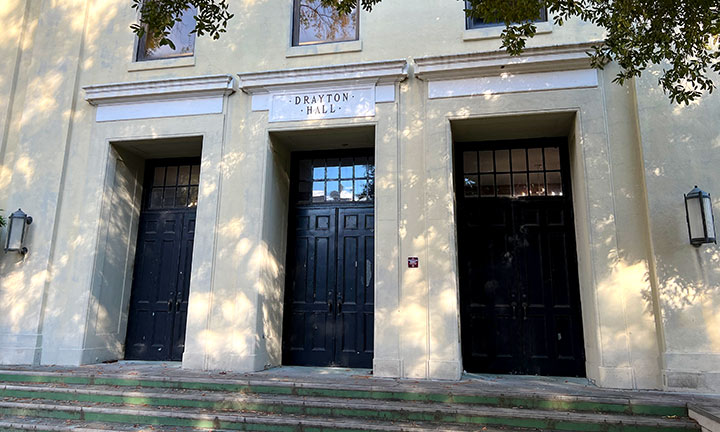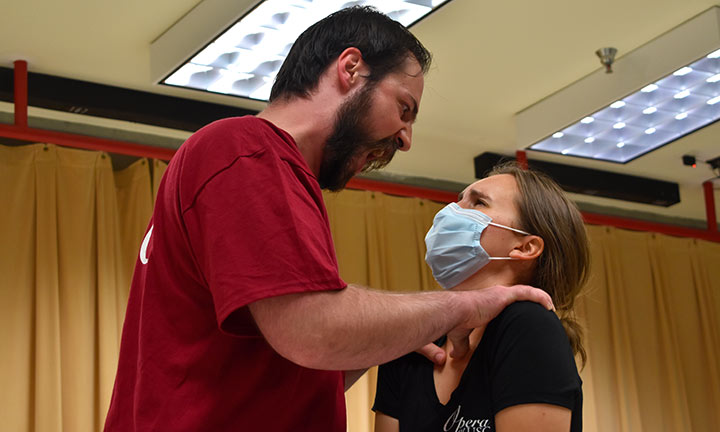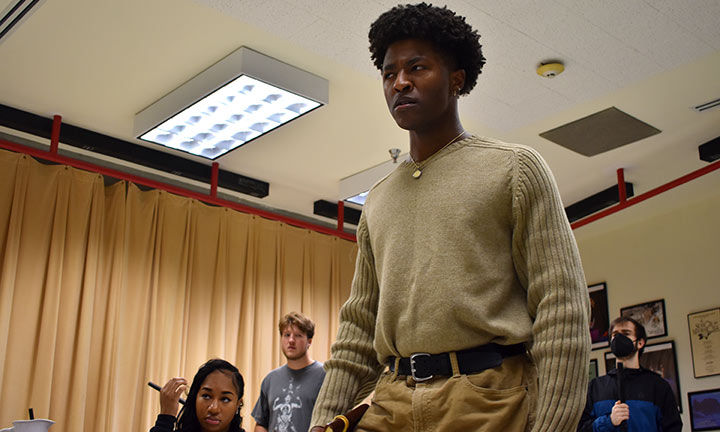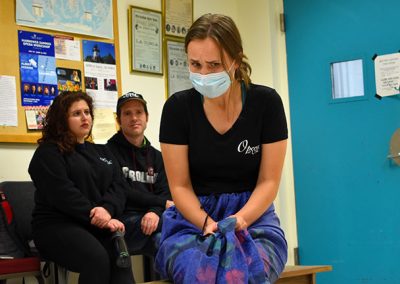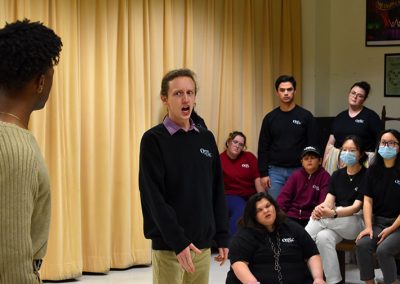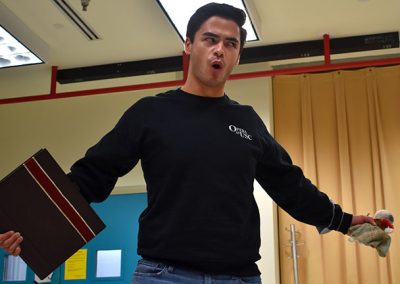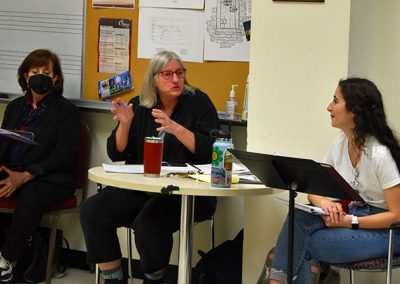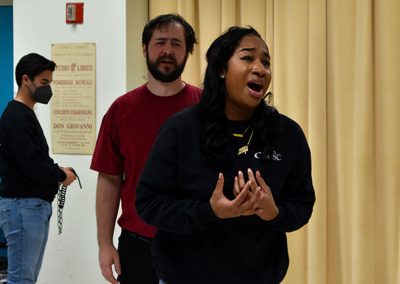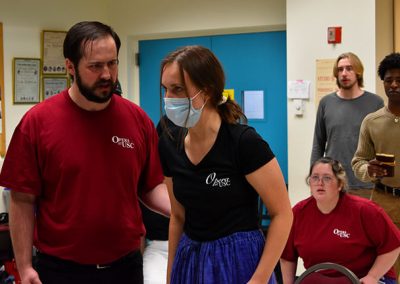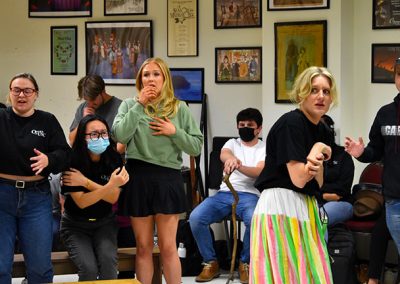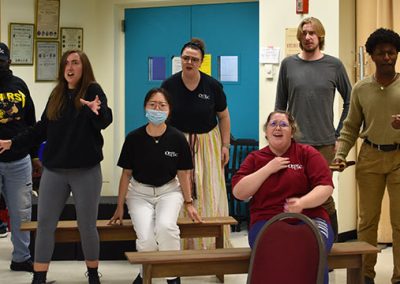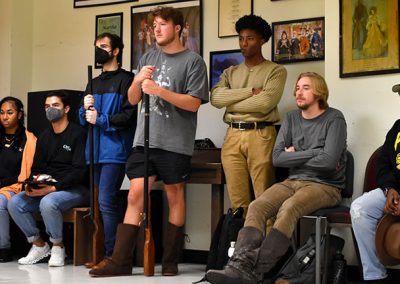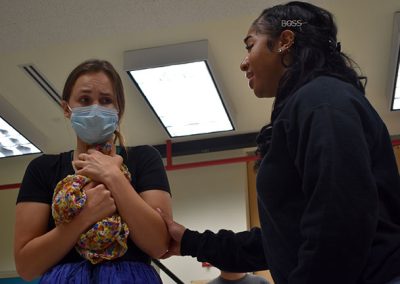Abraham Hardy and LaDejia Bittle will star as John and Elizabeth Proctor in USC’s next opera, “The Crucible.” (Photos by Jack Veltri)
Walking into the basement of the University of South Carolina’s School of Music, a woman is on the ground crying hysterically. Moments later, she stands up and begins singing.
Brittany Martin is rehearsing her character, Mary Warren, a woman accused of being a witch in Salem, Massachusetts. She is part of Opera at USC’s new show, “The Crucible,” which opens this weekend.
“It’s energizing to sing and getting to play something that you don’t usually get to — just yell whenever you’re feeling sad,” said Martin. “But Mary Warren gets to do that on stage.”
“The Crucible” is a famous play by Robert Ward that fictionalizes the real life 1692 Salem Witch Trials. Two hundred people were accused of witchcraft and 20 were executed, most of whom were women.
The play, or in this case, the opera, depicts townspeople living in fear as others around them are accused of witchcraft by religious leaders. It represents the consequences of false accusations based on religious dogma.
Some of its themes are still important today, said Ellen Schlaefer, who is directing the opera.
“All great works of art have a certain ‘universality of appeal,’ and the fact that the danger of the mob mentality exists throughout the world today did make me think of the opera,” she said.
One of the themes Martin believes connects between then and now is sexual orientation.
“There’s a lot of fear and hatred towards LGBTQ students happening all around our country right now in public schools,” Martin said.
In March 2022, Florida Governor Ron DeSantis signed the ‘Don’t Say Gay’ bill, which restricts public school teachers from instructing students about sexual orientation or gender identity.
“Public school systems are not necessarily a safe place for them right now,” Martin said. “And I think it comes from hysteria and misunderstanding.”
Bruce Isley plays the character of Rev. John Hale, who instigates the trials before realizing the accusations of witchcraft are based on religious hysteria and not facts. Isley sees parallels in the play with today’s culture wars.
“I think the political climate nowadays is kind of scary,” Isley said. “There’s always going to be accusations that will almost ruin someone’s career, but if they’re innocent, that’s what it’s about.”
Austin Means portrays Judge Danforth, who oversees the trials and determines the fates of the accused. He described the show as being “very twisted.”
“It’s a play of right versus wrong,” Means said. “Religious hypocrites versus people trying to get revenge for being called out for dancing in the woods. It adds this weird kind of complex story, and very interestingly put in only less than two hours.”
THE AUDITIONS AND CAST
Preliminary auditions were held in May, but Schlaefer waited until summer was over to make final casting decisions. She wanted to give everyone a second chance to audition when school started in August.
Schlaefer is responsible for choosing all the shows for USC’s School of Music. She said her decisions are based on helping students meet their degree requirements and introducing them to operas that they aren’t familiar with. Sometimes, logistics play a role.
“There are certain things that we just can’t or shouldn’t do — not all young voices can sing all of the opera stuff,” Schlaefer said. “It’s do we have the people for the show? No, we don’t. And well, let’s do this show. Well, no, that costs too much money. Well, let’s do this one. Okay, that one will work.”
Schlaefer said she wants all her music majors to participate in a classical opera from Mozart, pieces from the last three centuries, an operetta and a musical theater production.
“That’s a lot to try and fit in, but opera is a 500-plus-year-old art form,” Schlaefer said. “There are literally thousands of pieces to choose from. And today, I mean, we’re in a great period of new works being written for the voice for storytelling.”
Schlaefer said casting is like “a big jigsaw puzzle.” There are 26 roles, and not all of them go to college students. Abraham Hardy, who attended USC from 2013 to 2016, won the leading male role of John Proctor.
“I did a lot of roles while I was here, so they knew me and needed someone to do the part,” he said. “I submitted a tape just to check that I could still sing. … I still had to submit stuff. It wasn’t just handed.”
LaDejia Bittle, a second-year graduate student, won the leading female role of Elizabeth Proctor, John’s wife.
She auditioned with Mozart’s “Voi, Che Sapete” from “Marriage of Figaro,” which requires a particularly high vocal range.
“I told them the role I was interested in so that they knew why I was wanting to show the upper range,” Bittle said. “So I think that’s how I got it.”
The youngest cast member is 10-year-old Christian Mitchell. He has no speaking parts.
“I’m mostly in the third act,” said Mitchell, who plays Giles Corey’s grandson. Corey was a farmer in Salem accused of being a wizard. He was tortured to death in an attempt to get his confession.
Mitchell said his purpose in the show is to “protect my grandfather from going to jail.”
“He works really hard and takes it very seriously, which you don’t see in a lot of 10-year-olds,” Mitchell’s mother, Jennifer, said. “So I’m proud of how hard he’s working.”
THE REHEARSALS
“I mean, it’s physically exhausting,” Hardy said, referring to rehearsal. “This role is definitely very physical.”
Hardy’s character has the most stage time in the opera. He said John Proctor doesn’t take many breaks once act two begins — and there are four acts.
“I’m singing a lot,” Hardy said. “I haven’t measured time-wise, but I think that my actual singing is somewhere around 40 minutes.”
The crew typically rehearses four days during the week and once on the weekend. The rehearsals last about three hours. They don’t rehearse on Wednesdays because many of them are involved with their churches.
Bittle said one of the bigger challenges was creating on-stage chemistry with her character’s husband. Bittle and Hardy had never met before, and there are multiple scenes where the two must show affection.
There was a fine line between being respectful towards Hardy and not disrespecting his real-life wife, Bittle said.
“We didn’t do any boundary practice, so I didn’t know what sorts of physical things I could do to show my character without making them feel uncomfortable,” she said.
Boundary practice tests the comfortability between two intimate characters. Performers stroke their hand over parts of their counterpart’s body. Then, they have to describe the areas that they are both comfortable and uncomfortable with them touching.
Fortunately, the two castmates found their niche without formal boundary practice.
“The more rehearsals you have with someone and the more you get to know them, the easier it is, and the more comfortable it is to be the character and feel like you have permission to,” Bittle said.
Towards the end of the story, there’s a moment where John and Elizabeth embrace with a hug after he refuses to confess to his alleged crimes. Bittle remembered that Hardy asked if she was okay with such an intimate embrace.
With such an emotionally demanding opera, downtime can be difficult. Hardy is a father of five children and works a full-time job. During the day, he works at a Sleep Number manufacturing facility, where he coordinates outbound shipments and warehouse optimization.
Working and rehearsal can be a 16-hour day.
“It’s pretty long, but the rehearsal period is very intense and pretty short,” Hardy said. “I mean, the rehearsal period is about a month-long to get this ready. We come in prepared.”
Julia Fertel plays Rebecca Nurse, a woman accused of witchcraft who refuses to confess. Her downtime involves a complete removal from the dark themes of the opera.
“This is so embarrassing, but I really love watching Dance Moms,” Fertel said. “I work out a lot. So that helps me get all the aggression out. I also love music so much that I spend time going back to my musical theater stuff just to help me remember why I fell in love with this.”
GETTING INTO CHARACTER
One of the jobs of an actor or actress is to become the person they are playing. Many of the cast members said they aren’t anything like their characters in “The Crucible.”
Martin plays Mary Warren, John and Elizabeth Proctor’s servant. In the story, Warren claims she saw a ghost, and she feels threatened by John because he believes she’s acting insane.
“There are points where I am crying hysterically on the floor, spinning around, like I’m possessed by witchcraft, yelling and running across the room,” Martin said. “So it makes the singing more enjoyable because there’s a lot of character behind it.”
“If she’s scared, actually having the physical movement of what she would do when she’s afraid — cowering and keeping her head low,” she added. “I think even adding that physical element helps to get the emotion through the character.”
For Hardy, playing John Proctor means dealing with the moral failings of his character, who has an affair.
“I’m definitely glad I don’t take his character home because he’s a harder man than I am,” Hardy said.
“Ellen suggested to all of us that we go back and we re-read the play,” Isley said, “and maybe even watch one of the old-fashioned movies of it just to get into our heads that this was actually reality and that people legitimately lost their lives behind accusations of witchcraft.”
It was important for Isley to embody who Rev. Hale is — a character that goes through a lot of changes. He acts as the driving force behind the witch trials, trying to get confessions and insisting others testify. He eventually starts to see problems with his tactics and comes to believe the accused are innocent.
“There weren’t too many recordings that I could watch of this in regard to professional showings of it,” Isley said. “A couple of universities did it. But I feel all of us who have played the role of Hale have almost, not necessarily a stoic, but a more serious, more inquisitive and more scientific outlook on the role.”
Schlaefer said she wants her female students to convey how people treated women during the witch trials.
“I spent a lot of time writing about what I feel as myself, as well as how I feel as the character — what is different about her world, what her world looks like,” Fertel said. “You take in what the world felt like at that time. … So I did a lot of research on puritanical society.”
“I’ve been in about 40 productions and there’s something particularly challenging about this role and this character,” she added. “This type of material can be very sensitive. It has been a challenging experience but something that I’ve been willing to take on.”
SHOWTIME
Opera at USC will take the stage at the Drayton Hall Theatre, across the street from Cool Beans, beginning Friday, Nov. 4 at 7:30 p.m. Performances will run through the weekend: Saturday night at 7:30 p.m. and Sunday afternoon at 3 p.m.
Drayton Hall Theatre, located on college street across from Cool Beans, will host “The Crucible” from Nov. 4-6.
Hardy’s John Proctor grabs Brittany Martin’s Mary Warren by her collarbone area during a rehearsal practice.
Bruce Isley usually can be found with a smile on his face when he’s not practicing. But when he steps into the role of Rev. John Hale, it’s all business for him.
Martin’s Mary Warren runs into Abigail Williams’ (played by Payton Parker) arms during an emotional scene at rehearsal.


